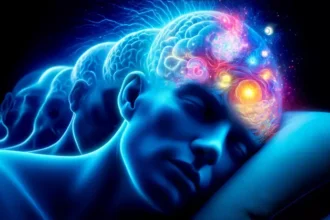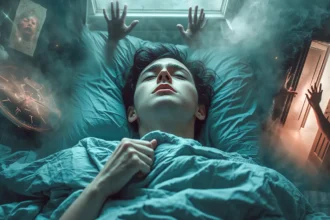Nightmares are a common sleep disturbance that can be profoundly disturbing and often leave us feeling anxious and fearful upon awakening. Typically occurring during the REM (Rapid Eye Movement) stage of sleep, when most dreaming happens, nightmares are more than just bad dreams.
They are vividly realistic and often involve scenarios that stir fear, sadness, or anxiety. Understanding the mechanics of nightmares, how they occur and why they can sometimes dominate our nights, is crucial for anyone looking to mitigate their effects and achieve better sleep quality.
While occasional nightmares are a normal part of sleep for most people, frequent and severe nightmares can significantly disrupt sleep patterns and impair daytime functioning. This deeper understanding of nightmares not only illuminates the challenges they present but also sets the stage for exploring effective strategies to manage them.
By delving into the science behind nightmares, including their causes and triggers, we can begin to take control back from these nocturnal disturbances and work towards a solution that facilitates more restful and peaceful nights.
What Causes Nightmares?

Nightmares often stem from the stresses and anxieties of daily life. Whether it’s worrying about work, relationship issues, or other life pressures, these stresses can invade our dreams, turning them into vivid and unsettling experiences during sleep.
Traumatic events are also a significant trigger for nightmares. People who have endured accidents, violence, or intense stress may find these events replaying in their dreams.
These nightmares can be particularly vivid, making it feel as though the trauma is being experienced all over again.
Diet and sleep habits also influence the likelihood of experiencing nightmares. Eating heavy or spicy foods close to bedtime can kickstart metabolism and brain activity, leading to restless sleep and more intense dreams.
Additionally, inconsistent sleep schedules can disrupt natural sleep rhythms, increasing the chances of nightmares.
Certain medications can trigger nightmares as well. Drugs that affect the brain’s chemical balance, especially those that impact neurotransmitters related to sleep, may increase the frequency of nightmares.
Withdrawal from medications or substances like alcohol can also lead to disturbed sleep and nightmares.
While occasional nightmares are common, recurring nightmares can be a sign of underlying issues. Understanding what triggers your nightmares can be the first step toward reducing their frequency and improving your sleep quality.
Addressing these triggers often requires changes in lifestyle, and habits, or sometimes professional help.
The Brain and Nightmares

Nightmares occur during the rapid eye movement (REM) phase of sleep, a time when the brain is very active. During this stage, the brain processes emotions and experiences from the day, which can manifest as vivid dreams or nightmares, especially if there’s unresolved stress or anxiety.
The brain structures involved in creating nightmares include the amygdala, which processes emotions, and the cortex, which handles complex thoughts. This combination can produce the vivid and often disturbing visual imagery experienced in nightmares, linking emotional content with past and current experiences.
Nightmares tend to happen in the later stages of sleep, during longer REM periods. This timing means that the dreams can be more intense and more likely remembered upon waking.
It’s during these times that the brain is particularly active in sorting through and trying to make sense of vast amounts of emotional data.
Research suggests that nightmares might have a purpose, such as helping to prepare us for real-life stresses or processing traumatic events. By experiencing intense scenarios in dreams, we may be better equipped to handle similar situations when awake, providing a kind of emotional rehearsal.
Despite their disturbing nature, understanding that nightmares are a normal part of the brain’s process of emotional regulation can be reassuring. They become a concern primarily when they frequently disrupt sleep or cause distress during waking hours, indicating deeper psychological or physiological issues that might need addressing.
Nightmares vs. Night Terrors
It’s important to distinguish between nightmares and night terrors, as they are different sleep disturbances. Nightmares are vivid, disturbing dreams that usually wake you up, leaving you with a clear memory of what frightened you.
They occur during REM sleep, the phase where most dreaming happens.
Night terrors, on the other hand, are a type of sleep disorder occurring during non-REM sleep. They are characterized by feelings of panic and behaviors like screaming, thrashing, or sleepwalking.
Unlike nightmares, night terrors typically leave no memory of dream content once a person wakes up.
Children are more frequently affected by night terrors compared to adults. These episodes are usually short but can be very distressing to witness.
The person may seem to be awake during a night terror, but they are actually asleep and won’t remember the event in the morning.
Managing night terrors often involves improving sleep hygiene, reducing stress, and, in some cases, medical intervention. It’s less about the content of dreams and more about reducing the incidence of these frightening episodes.
Understanding these differences is crucial for effective management. While nightmares can often be addressed by dealing with stress or avoiding certain triggers, night terrors may require a consultation with a healthcare provider to explore deeper underlying causes and appropriate treatment strategies.
Managing and Reducing Nightmares

Improving sleep hygiene is one of the first steps in managing and reducing nightmares. This includes establishing a regular sleep schedule, creating a relaxing bedtime routine, and making the sleep environment comfortable and conducive to rest.
Avoiding stimulants like caffeine and electronic screens before bedtime can also help.
For those whose nightmares are linked to stress or anxiety, techniques such as mindfulness, meditation, and stress management can be beneficial. These practices help calm the mind and can reduce the frequency of nightmares by lowering overall stress levels.
Therapeutic approaches like imagery rehearsal therapy (IRT) are specifically designed to help people with recurring nightmares. This technique involves changing the ending of the remembered nightmare while awake, making it less threatening.
It is practiced during the day and can help lessen the impact of nightmares over time.
For individuals with persistent nightmares, especially those suffering from PTSD or anxiety disorders, professional help from a therapist might be necessary. Cognitive-behavioral therapy (CBT) has been effective in treating nightmare disorders by addressing the underlying issues that contribute to disturbing dreams.
Lastly, maintaining overall health through regular physical activity and a balanced diet contributes to better sleep quality. Avoiding heavy meals, nicotine, alcohol, and intense physical activity before bedtime can prevent factors that trigger nightmares, leading to more peaceful nights.
Conclusion
If nightmares frequently disrupt your sleep, recognizing the triggers and understanding the underlying causes is crucial. For many, lifestyle adjustments such as improving sleep hygiene, managing stress, and avoiding certain medications can significantly reduce the frequency and intensity of nightmares.
Techniques like relaxation exercises before bed or maintaining a regular sleep schedule might help alleviate the problem by promoting more consistent and uninterrupted sleep.
For those who suffer from persistent nightmares that continue to disrupt sleep and cause significant distress, it might be necessary to seek professional guidance. A healthcare provider can offer specialized therapies like imagery rehearsal therapy or cognitive-behavioral therapy, which have been shown to be effective in reducing nightmares, particularly in individuals suffering from stress-related disorders.
Taking these steps not only improves sleep quality but also enhances overall health and well-being, ensuring that nightmares do not hold sway over our nights or our lives.
FAQ
Nightmares compared to Sleep Disorders, Stress Management, and REM Sleep
| Aspect | Nightmares | Sleep Disorders | REM Sleep | Stress Management |
|---|---|---|---|---|
| Causes | Nightmares often arise from stress, trauma, or anxiety-related experiences. | Sleep disorders can stem from various factors, including medical and psychological issues. | REM sleep is essential for emotional regulation and memory consolidation. | Stress management techniques can reduce the occurrence of nightmares. |
| Effects | They can lead to anxiety, fear, and disrupted sleep patterns. | Sleep disorders may cause excessive daytime sleepiness and fatigue. | REM sleep disturbances can affect overall sleep quality and mood. | Effective stress management can improve sleep quality and reduce nightmares. |
| Management Techniques | Cognitive-behavioural therapy is a common approach for managing nightmares. | Sleep disorders often require medical intervention or lifestyle changes. | Practices like meditation can enhance REM sleep quality. | Stress management includes techniques like mindfulness and relaxation exercises. |
| Frequency | Nightmares can occur sporadically or frequently, depending on the individual. | Sleep disorders can be chronic or episodic, affecting many people. | REM sleep typically occurs multiple times during a sleep cycle. | Stress management can be practiced regularly to maintain sleep health. |
| Impact on Sleep | They can significantly impair daytime functioning and emotional well-being. | Sleep disorders may lead to long-term health complications if untreated. | Disrupted REM sleep can result in cognitive impairments and mood swings. | Effective stress management can lead to improved overall health. |
| Associated Conditions | Associated with anxiety disorders, PTSD, and other mental health issues. | Sleep disorders can be linked to insomnia, sleep apnea, and restless legs syndrome. | REM sleep is crucial for processing emotions and learning. | Stress management techniques can help mitigate anxiety and improve sleep. |



























